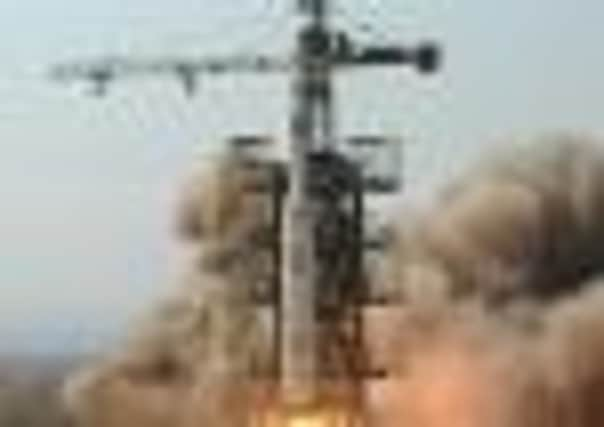North Korean satellite plans put US food aid effort at risk


The US yesterday said it was hard to imagine it could go through with the exchange if the launch took place, and UN Security Council members said it may violate sanctions.
The North agreed to a moratorium on long-range launches as part of the food deal with Washington, but argues that satellite launches are part of a peaceful space programme.
Advertisement
Hide AdAdvertisement
Hide AdThe US, South Korea and Japan say the rocket technology overlaps with belligerent uses and claim the satellite programme is a disguised test of military missiles in defiance of a UN ban.
Britain’s UN Ambassador Mark Lyall Grant, the current Security Council president, said the rocket launch would violate UN sanctions.
US Secretary of State Hillary Clinton called the announcement of the launch “highly provocative.”
“Such a missile launch would pose a threat to regional security and would also be inconsistent with North Korea’s recent undertaking to refrain from long-range missile launches,” she said in a statement, urging Pyongyang to abide by its international obligations.
The launch will take place between 12-16 April 12 from a base in North Phyongan province as part of celebrations marking the 15 April centenary of the birth of North Korea’s founder, Kim Il-sung.
A North Korean space committee spokesman said a Kwangmyongsong-3 satellite designed to orbit the earth will be mounted on Unha-3 rocket and launched from the Sohae station in Cholsan county. He called it a “working” satellite that was an improvement over two previous “experimental” satellites.
Pyongyang’s announcement comes as North Korea’s leader, Kim Jong-un, seeks to solidify his rule of the nation of 24 million people in the wake of father Kim Jong-il’s death in December.
“The window for the launch is important in terms of the domestic politics of the North,” said Daniel Pinkston, an expert on North Korea’s weapons programmes at the International Crisis Group.
Advertisement
Hide AdAdvertisement
Hide AdHe said the launch serves to underline North Korea’s military capabilities and reinforce Kim’s fledgling rule.
Such a launch aims to reinforce unity at home by provoking new tensions that will allow its leadership to portray the country as beset by hostile forces.
A third nuclear test could be next, Mr Pinkston said.
He added: “I can’t see how the US is going to deliver this food aid. I think this is going to kill it.”
North Korea agreed last month to suspend uranium enrichment, place a moratorium on nuclear and long-range missile tests and to allow back UN weapons inspectors in exchange for much-needed food aid.
Uranium enrichment is one way to make atomic bombs. In the past North Korea has also weaponised plutonium for nuclear devices.
North Korea called the April 2009 launch a bid to send a communications satellite into space, but it was widely viewed in the West as a violation of UN Security Council resolutions prohibiting nuclear and ballistic missile activity.
Shortly after the 2009 launch, Pyongyang declared that it would abandon six-nation negotiations on offering the North aid and concessions in exchange for nuclear disarmament.
And weeks later, North Korea tested a nuclear device, the second in three years – earning the regime tightened UN sanctions.